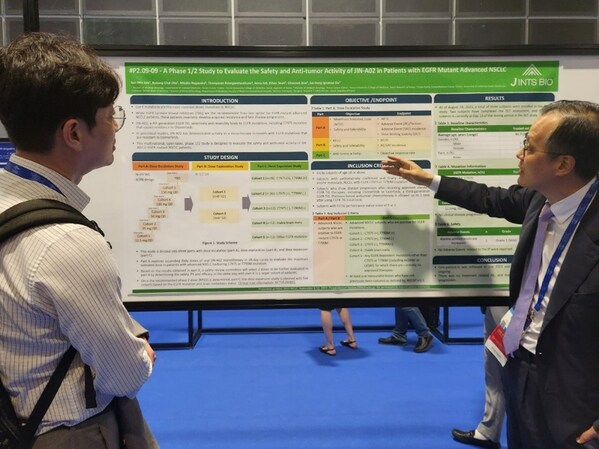SEOUL, South Korea, Sept. 13, 2023 /PRNewswire/ — J INTS BIO announced that Phase 1/2 study of its novel, orally administered 4th generation EGFR-TKI ‘JIN-A02’ was presented at the 2023 IASLC World Conference on Lung Cancer held in Singapore from 9th to 12th September, during the official session entitled "Metastatic Non-small Cell Lung Cancer – Targeted Therapy – EGFR/HER2".

Professor Cho, Byoung Chul, poster presentation of Phase 12 study of its Novel Oral 4th Generation EGFR-TKI ‘JIN-A02’ at the WorldConference on Lung Cancer in Singapore (IASLC 2023 WCLC)
JIN-A02, a 4th generation EGFR TKI, selectively and reversibly binds to EGFR mutations, in particular C797S mutation that led to resistance to Osimertinib therapy. In preclinical studies, JIN-A02 has demonstrated potent activities as monotherapy in models with EGFR mutations that are resistant to Osimertinib.
This global phase 1/2 clinical study seeks to evaluate the safety, pharmacokinetics, and anti-tumor activity of "JIN-A02" in advanced NSCLC patients carrying EGFR mutations.
This study is divided into three parts with dose escalation (Part A), dose exploration (Part B), and dose expansion (Part C). Part A explores ascending doses of oral JIN-A02 monotherapy in 28-day cycles to evaluate the maximum tolerated dose in patients with advanced NSCLC harboring C797S or T790M mutation. Based on the results obtained in part A, a safety review committee will select 2 doses to be further evaluated in Part B by determining the safety, pharmacokinetics, and efficacy in the same way as Part A albeit in a larger cohort of patients. Once the recommended Phase 2 dose (RP2D) is determined, Part C, the dose expansion study, will begin with five cohorts of patients based on the EGFR mutations and brain metastasis status.
Dosing of the first patient with JIN-A02 was achieved in July 2023 and as of 11th of September 2023, a total of three subjects have completed MTD evaluation period for Dose Level One of Part A. There was no DLT, no treatment related AE, and no clinical disease progression was noted.

